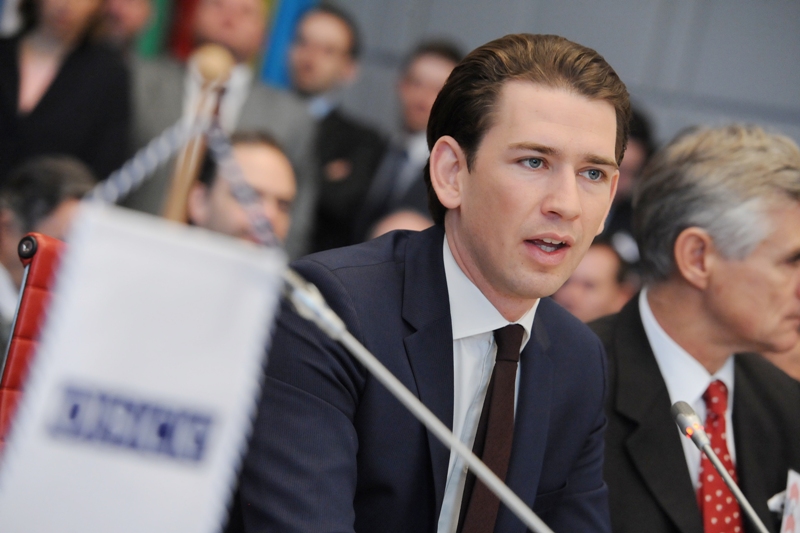The Vienna-based International Press Institute (IPI) welcomed Austria’s assumption of the 2017 chairmanship of the Organization for Security and Cooperation in Europe (OSCE) last week, calling on the country to use the opportunity to strengthen cooperation to protect and promote media freedom among OSCE participating states.
Austrian Federal Minister for Europe, Integration and Foreign Affairs Sebastian Kurz became chairperson-in-office of the 57-member-state international governmental organisation for a one-year term on Jan. 1, taking over from Germany.
In his inaugural address to the OSCE Permanent Council on Thursday, where he presented Austria’s program for its chairmanship, Kurz, citing complex conflicts across the region, said that re-establishing trust among OSCE participating states would be one of Austria’s priorities.
The OSCE – which includes countries in Europe, North and Central Asia, and North America – has worked on security-related issues since its formation in 1994. Its origins lie in the 1975 Conference on Security and Co-operation in Europe between Eastern and Western Bloc nations.
The organisation’s comprehensive approach to security covers cooperation on migration, counter-terrorism, arms control and human rights. Each year, the OSCE chairmanship is held by a different participating state, which gives the hosting country the opportunity to coordinate decision-making and to set priorities for the OSCE’s work during the term.
Kurz recently spoke with IPI about media freedom in the OSCE region and his plans for Austria’s chairmanship.
IPI: How does Austria plan to use its chairmanship to promote human rights in the OSCE region, particularly free expression and press/media freedom?
Kurz: Austria attaches great importance on fundamental freedoms, human rights, rule of law, and democracy. These are a precondition to and an integral part of sustainable security, stability, and prosperity. In this regard, we also continue to prioritise media freedom, and in particular the safety of journalists in international fora. As Chairperson-in-Office, I intend to uphold our policy, to promote and strengthen media freedom and free speech across the OSCE region. Freedom of expression and freedom of the media are a part of our main thematic priorities in the area of human rights and democracy. Austria will work in close co-operation with the OSCE Representative on Freedom of the Media, Dunja Mijatović, as well as other key partners, such as the IPI, and civil society and journalists throughout the year to address concrete issues in this field.
In this regard, one of the first OSCE Chairmanship events to take place this year will be on “Freedom of the Media in the Western Balkans” to underline that this topic as well as the region are of particular importance to Austria.
IPI: What are the greatest challenges to free expression and press/media freedom in OSCE countries?
Kurz: There are many challenges to free expression and freedom of the media across the OSCE region. Physical safety of journalists, legal restrictions, freedom of expression on the Internet, access to information, accreditation challenges, media ethics and professional standards, and the list goes on. Dunja Mijatović regularly addresses these issues across the OSCE region; and Austria is working very closely with her to follow these issues.
For a number of years already, Austria has made the safety of journalists a top priority in various international and regional fora. Journalists’ safety must be ensured at all times, particularly, but not exclusively, in times of conflict. Unfortunately, threats and attacks against the media are not isolated to conflict zones only, but occur regularly across the entire OSCE region, and this needs to be addressed too. We also observe many more sophisticated ways to achieve the same end goal, silencing the media. This ranges from threats or smear campaigns against journalists online – particularly women journalists who face a double-edged sword in this regard – to legislative restrictions criminalising their work and imprisoning journalists.
One of the priority areas I have emphasised as a key challenge to our regional security is the issue of radicalisation, particularly of young people. I intend to tackle this issue, as OSCE Chairperson-in-Office, in a cross-dimensional and comprehensive manner. At the same time any attempt to counter violent extremism and radicalisation that lead to terrorism must be fully in line with human rights and fundamental freedoms.
IPI: In light of your recent visit to Ukraine, what role can press/media freedom and the free flow of information play with respect to resolving conflicts within or among OSCE countries?
Kurz: As you mentioned, I visited Eastern Ukraine at the very beginning of our Chairmanship. It was particularly important for me to visit the region and to get a more accurate picture of the situation on the ground. The OSCE is working tirelessly to resolve the conflict in and around Ukraine, but also to tackle many specific issues that have arisen since the conflict. One of those areas is the physical safety of journalists reporting in conflict zones. Another is to bring together the media from both sides to work together to create a stronger sense of solidarity for the profession and their colleagues on the ground.
The free flow of information is imperative in any given conflict, as it is the courageous journalists who are able to keep the world informed on what is happening on a day to day basis. Ensuring their safety is paramount. Further, it is important that they report professionally and truthfully. Propaganda for war and hatred, and fake news are not journalism; it is dangerous and can only [exacerbate] existing conflicts. On the other hand, professional, ethical, and peace journalism can encourage reconciliation. Nevertheless, the media plays a crucial role in informing the public; it is not the source or solution to a conflict, and therefore should not be held to account in this regard.
